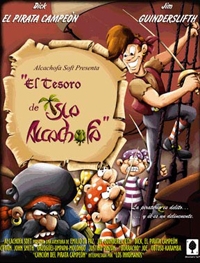Mort & Phil is a Spanish comic series, published in more than two dozen languages. It appeared for the first time in 1958 in the children's comic-book magazine Pulgarcito drawn by Francisco Ibáñez. The series features Mort, the tall, bald master of disguise named after mortadella sausage, and his bossy partner, the shorter, pudgier Phil Pi, named after fillet. Initially, they were private detectives operating as Mortadelo y Filemón, Agencia de Información, but now both serve as secret agents in the T.I.A., the Técnicos de Investigación Aeroterráquea. Tía is the Spanish word for "aunt".

Runaway: A Road Adventure is a 2001 graphic adventure game developed by the Spanish company Pendulo Studios and published by Dinamic Multimedia. It follows the story of Brian Basco, an American college student on the run after he unwittingly saves a murder witness named Gina Timmins from assassination by the New York Mafia. Searching for clues about a mysterious crucifix linked to the murder, Brian and Gina embark on a cross-country journey through the United States while pursued by two Mafia hitmen. The player assumes the role of Brian and explores the game world while collecting items, solving puzzles and conversing with non-player characters.

Jack Orlando: A Cinematic Adventure is a 1997 point-and-click adventure game by Polish developer Toontraxx and German publisher TopWare Interactive. In 2001, a director's cut version was released, which adds the choice between easy and normal difficulty. The game was re-released in 2009 on GOG.com, and on January 26, 2012, a port of the director's cut was released on Steam.
Pendulo Studios S.L. is a Madrid-based video game developer founded in 1993 by Ramón Hernáez, Felipe Gómez Pinilla, Rafael Latiegui and Miguel Angel Ramos. Since the company's 1994 debut project, Igor: Objective Uikokahonia, it has specialized in graphic adventure games. Pendulo first achieved mainstream prominence in Spain via Hollywood Monsters (1997), which met with critical and commercial success in the country but was never released beyond Southern Europe.

Necronomicon: The Dawning of Darkness, also known as Necronomicon: The Gateway to Beyond and Necronomicon : L'Aube des ténèbres in French, is a 2000 video game developed by Wanadoo Edition and released for Windows and the PlayStation video game console.

Hollywood Monsters is a 1997 graphic adventure game developed by the Spanish company Pendulo Studios and published by Dinamic Multimedia. It takes place in an alternate-history 1950s, where the creatures from Golden Age monster movies are played by real monsters who lead otherwise normal lives. Controlling reporters Sue Bergman and Ron Ashman, the player seeks to unravel a mystery surrounding the murder of Frankenstein's monster. In the process, the player undertakes a globetrotting journey to locations like Transylvania and Egypt, while solving puzzles and interacting with characters such as Count Dracula, the Invisible Man and the Mummy.
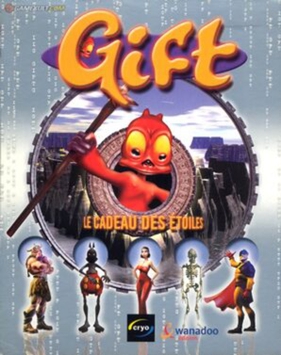
Gift is a platform game developed by French studio Eko Software that parodies elements of popular adventure games. It was created by Cryo Interactive's creative director Philippe Ulrich and by author, cartoonist and illustrator Régis Loisel. The game is set over ten levels in a fully three-dimensional world.
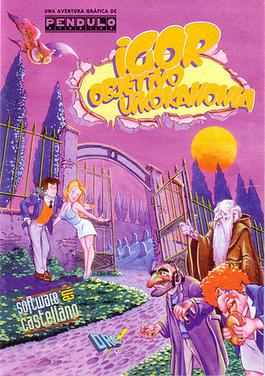
Igor: Objective Uikokahonia is a 1994 graphic adventure game developed by the Spanish company Pendulo Studios and published by DROsoft. The game tells the story of Igor Parker, a university student in love with a classmate named Laura Wright. Hoping to win her affection, Igor surmounts a series of obstacles in an effort to join her on a field trip to the island paradise of Uikokahonia. The player assumes the role of Igor and navigates the campus while collecting items, solving puzzles and conversing with non-player characters.
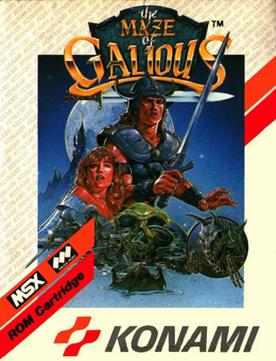
The Maze of Galious is a 1987 platform-adventure video game developed and published by Konami for the MSX home computer. A reworked conversion was released for the Family Computer. Both versions were re-released digitally for Microsoft Windows. The second entry in the Knightmare trilogy, it follows the respective hero and former damsel in distress of the previous game, Popolon and Aphrodite, as they embark on a journey through Castle Greek to free their unborn child Pampas from the evil priest Galious. The player explores each map in search for items and power-ups to progress, while also fighting enemies and bosses.

Mortadelo y Filemón: Una Aventura de Cine is a 2000 adventure video game for Windows. It was re-released in Spain in November 2003, and in Germany in 2004 by Crimson Cow, and was developed by Spanish studio Alcachofa Soft. The game is in German, but was never localized to English. It is the third game in the Mort & Phil adventure game series, following El Sulfato Atómico (1998) by Alcachofa and La Máquina Meteoroloca (1999) by Vega Creaciones Multimedia.

Katharsis is a horizontally scrolling shooter from Polish developer Metropolis Software House and published by CD Projekt in 1997.

The Guardian of Darkness is a French action game developed and published by Cryo Interactive in 1999.

Tunguska: Legend of Faith is an action-adventure video game by German-based studio Exortus GmbH, released on PC and later PlayStation. It received largely negative reviews from critics.

Victi: Blood Bitterness is a point-and-click adventure video game developed by French studio Freegamer and published by Microapplication. It was released in 2006 on Windows.
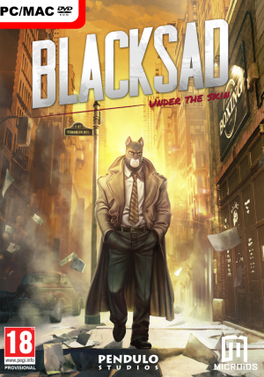
Blacksad: Under the Skin is a 2019 adventure game developed by Pendulo Studios and published by Microïds. The game is an adaptation of the Spanish comic series Blacksad by Juan Díaz Canales and Juanjo Guarnido. It follows John Blacksad as he investigates the suspicious death of a boxing club owner.

Dráscula: The Vampire Strikes Back is a 1996 graphic adventure game developed by Alcachofa Soft. It was created in Spain, and was the first adventure game released by Alcachofa. In 1999, Midas Interactive Entertainment released an English version of the game in the United Kingdom. Dráscula tells the story of John Hacker, a realtor who attempts to help "Count Drascula" sell real estate in Transylvania.

Mortadelo y Filemón: El Sulfato Atómico is a 1998 graphic adventure game developed by the Spanish company Alcachofa Soft and published by Zeta Multimedia.
The history of video gaming in Spain dates back to the 1970s, and by 2014 the country was the 10th-highest-grossing market for video games worldwide. In 2018, the Spanish video game market posted a revenue of €1.53 billion, up from €1.35 billion in 2017. The country's audience of game players was 16.8 million that year; demographically, it was 59% male and 41% female. Reportedly 80% of people aged 6-to-10 played video games, while 24% of those in the 45–64 age range did so.
Alcachofa Soft was a video game developer in Toledo, Spain, founded in 1995 and specializing in graphic adventure games.
